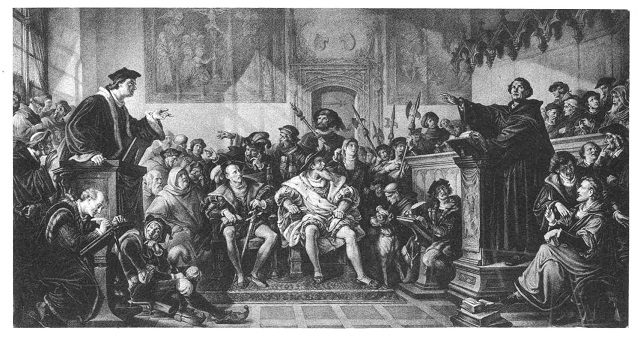(Including Luther’s Dissent at the Leipzig Disputation in 1519)

Leipzig Disputation, by Julius Hübner (1806-1882) [public domain / Wikimedia Commons]
***
(10-8-07)
***
It would be a complex discussion regarding what exactly constitutes the equivalent of infallibility, if the word itself is not present. There are many similar notions such as papal authority, conciliar authority, papal primacy, headship, papal supremacy, indefectibility, being without error, the impossibility of disagreeing with a papal proclamation without one’s orthodoxy being questioned, etc. All of those can be traced back to very early times. Papal infallibility developed just as all Christian doctrines do. No surprise there . . .
But if we restrict ourselves to uses of the word itself, (and with direct reference to the pope), I knew of one such use right off the bat, because it was included in my book, A Biblical Defense of Catholicism, pp. 212-213. It comes from a Doctor of the Church, St. Francis de Sales, and his book, The Catholic Controversy, completed in 1596. Note how remarkably it anticipates the later fully-developed dogma of papal infallibility, as pronounced at the First Vatican Council in 1870 (which is precisely why I used it in my book):
When he teaches the whole Church as shepherd, in general matters of faith and morals, then there is nothing but doctrine and truth. And in fact everything a king says is not a law or an edict, but that only which a king says as king and as a legislator. So everything the Pope says is not canon law or of legal obligation; he must mean to define and to lay down the law for the sheep, and he must keep the due order and form.
We must not think that in everything and everywhere his judgment is infallible, but then only when he gives judgment on a matter of faith in questions necessary to the whole Church; for in particular cases which depend on human fact he can err, there is no doubt, though it is not for us to control him in these cases save with all reverence, submission, and discretion. Theologians have said, in a word, that he can err in questions of fact, not in questions of right; that he can err extra cathedram, outside the chair of Peter. that is, as a private individual, by writings and bad example.
But he cannot err when he is in cathedra, that is, when he intends to make an instruction and decree for the guidance of the whole Church, when he means to confirm his brethren as supreme pastor, and to conduct them into the pastures of the faith. For then it is not so much man who determines, resolves, and defines as it is the Blessed Holy Spirit by man, which Spirit, according to the promise made by Our Lord to the Apostles, teaches all truth to the Church. (The Catholic Controversy, translated by Henry B. Mackey, Rockford, Illinois: TAN Books, 1989 from the 1886 publication [London and New York], 306-307; available online)
Yet critics of the Catholic Church often contend that no one claimed that the pope was infallible until the 19th century. Well, this instance beats that by at least 204 years, or 274 years before 1870.
Another example dates from a 1690 Decree of the Holy Office during the reign of Pope Alexander VIII (1689-1691): Errors of the Jansenists. Among the errors condemned is the following:
29. Futile and many times refuted is the assertion about the authority of the Roman Pontiff being superior to that of an ecumenical Council and about his infallibility in deciding questions of faith. (Henry Denzinger, The Sources of Catholic Dogma [Enchiridion Symbolorum], #1319; online; other earlier references in this work to earlier developed statements of infallibility are #100, 109-110, 129, 139, 142, 160, 171, 351, 570Q, 1000)
This is decried as “Condemned and prohibited as rash, scandalous, evil-sounding, injurious, close to heresy, smacking of heresy, erroneous, schismatic, and heretical respectively.”
Thus far we have found statements from 1596 and 1690. But how about something very close in concept from 1520? That is a full 350 years before 1870 and 280 before the beginning of the 19th century. This comes from the condemnation of Martin Luther’s errors: the papal Bull Exsurge Domine, of June 15, 1520. Here are two of the 41 propositions condemned:
[Denzinger number] 767 27. It is certain that it is not in the power of the Church or the pope to decide upon the articles of faith, and much less concerning the laws for morals or for good works.
768 28. If the pope with a great part of the Church thought so and so, he would not err; still it is not a sin or heresy to think the contrary, especially in a matter not necessary for salvation, until one alternative is condemned and another approved by a general Council.
To be more specific:
Censure of the Holy Pontiff: “All and each of the above mentioned articles or errors, so to speak, as set before you, we condemn, disapprove, and entirely reject as respectively heretical, or scandalous, or false, or offensive to pious ears, or seductive of simple minds, and in opposition to Catholic truth.”
As is often said in discussions on the history of development of Christian doctrine: “an article is not defined until it is violated.” One observes this very often in the early historical battles of the Catholic Christian Church with the great heresies such as the Arians, Monophysites, Pelagians, and Gnostics. It still held true in the 16th century.
Martin Luther hadn’t expressly denied papal authority per se in his 95 Theses (October 31, 1517). That was to come later, certainly by the time of the 18-day Leipzig Disputation of July 1519, with John Eck, where Luther was essentially pressed — a victim of his own faulty logic and ecclesiological understanding — into adopting something akin to sola Scriptura, and rejecting papal and conciliar infallibility.
Luther biographer Roland Bainton notes how Luther’s accusing the pope of committing serious errors in 1518 was “upping the ante” of the brewing theological controversy considerably:
. . . in the interim Luther had attacked not only the papal power to loose but also the power to bind through the ban. He had further declared the pope and councils to be capable of error. (Here I Stand, New York: Mentor, 1950, 78-79)
Luther was firing shots at Eck even before the debate, as noted by Bainton; for example:
Let it be understood that when I say the authority of the Roman pontiff rests on a human decree I am not counseling disobedience. But we cannot admit that all the sheep of Christ were committed to Peter. What, then, was given to Paul? When Christ said to Peter, “Feed my sheep,” he did not mean, did he, that no one else can feed them without Peter’s permission? Nor can I agree that the Roman pontiffs cannot err or that they alone can interpret Scripture. The papal decretal by a new grammar turns the words of Christ, “Thou art Peter” into “Thou art the primate.” By the decretals the gospel is extinguished. I can hardly restrain myself against the most impious and perverse blasphemy of this decretal. (Ibid., 83)
Bainton recounts the dramatic climax of the debate:
“Let me talk German,” demanded Luther. “I am being misunderstood by the people. I assert that a council has sometimes erred and may sometimes err. Nor has a council authority to establish new articles of faith. A council cannot make divine right out of that which by nature is not divine right. Councils have contradicted each other, for the recent Lateran Council has reversed the claim of the councils of Constance and Basel that a council is above a pope. A simple layman armed with Scripture is to be believed above a pope or a council without it. As for the pope’s decretal on indulgences I say that neither the Church nor the pope can establish articles of faith. These must come from Scripture. For the sake of Scripture we should reject pope and councils.”
“But this,” said Eck, “is the Bohemian virus, to attach more weight to one’s own interpretation of Scripture than to that of the popes and councils, the doctors and the universities. When Brother Luther says that this is the true meaning of the text, the pope and councils say, ‘No, the brother has not understood it correctly.’ Then I will take the council and let the brother go. Otherwise all the heresies will be renewed. They have all appealed to Scripture and have believed their interpretation to be correct, and have claimed that the popes and the councils were mistaken, as Luther now does. It is rancid to say that those gathered in a council, being men, are able to err. This is horrible, that the Reverend Father against the holy Council of Constance and the consensus of all Christians does not fear to call certain articles of Hus and Wyclif most Christian and evangelical. I tell you, Reverend Father, if you reject the Council of Constance, if you say a council, legitimately called, errs and has erred, be then to me as a Gentile and a publican.” (Ibid., 90)
All of this discussion in the Leipzig Disputation presupposes both papal and conciliar infallibility or at least something very similar to it, since much of the point of sola Scriptura as a rule of faith was to assert biblical infallibility over against papal and conciliar.
I rest my case.
For more in-depth discussion of the many biblical and traditional rationales for infallibility, see the Catholic Encyclopedia article on this subject.
*****
Meta Description: Papal infallibility did not spring into existence suddenly in 1870, as many seem to think. Luther was well aware of it in one of his debates in 1519.
Meta Keywords: Leipzig Disputation, Vatican I, Luther & authority, Luther & the papacy, Luther & councils, Catholic authority, church authority, Church government, church infallibility, conciliar infallibility, infallibility, papal authority, papal infallibility, papal supremacy, Rule of Faith, Three-Legged Stool













